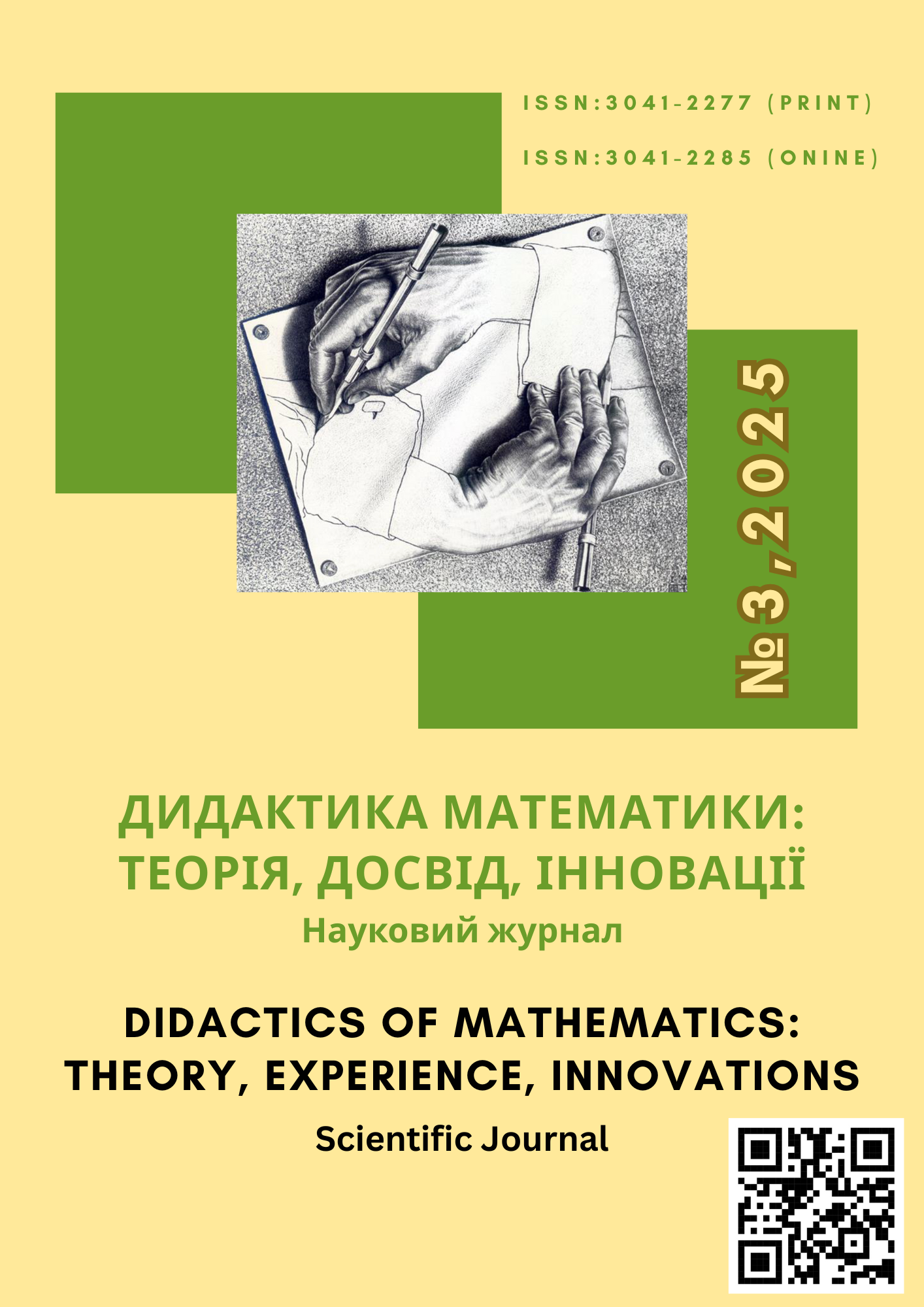Psychological and pedagogical aspects of organizing and conducting student mathematics competitions
https://doi.org/10.31652/3041-2277-2025-3-19-30Published 2025-07-15
Keywords
- mathematics competitions,
- future mathematics teachers,
- international research
Copyright (c) 2025 Ольга Матяш, Михайло Кривошея

This work is licensed under a Creative Commons Attribution 4.0 International License.
How to Cite
Abstract
The article highlights certain psychological and pedagogical aspects of organizing and conducting mathematics competitions for school students that mathematics teachers should take into account. To understand the impact of mathematics competitions on learning and the development of students' personal qualities, key educational and psychological theories are examined, including the constructivist theory of learning, self-determination theory, social learning theory, and self-efficacy theory. While mathematics competitions offer numerous educational benefits, they are also associated with certain challenges and limitations that require attention. The advantages and challenges of engaging students in mathematics competitions are not merely based on numerous pedagogical observations, but are comprehensively supported by international research. This article analyzes a number of such studies conducted by researchers from Turkey, India, Singapore, Taiwan, and Indonesia. It also presents international scholars’ recommendations for increasing the effectiveness of mathematics competitions. An analysis of teacher training programs in Ukrainian institutions of higher pedagogical education shows that the knowledge and skills acquired by future mathematics teachers during their professional preparation are insufficiently focused on working with mathematically gifted students, including in the context of organizing and conducting various mathematics competitions. By recognizing the benefits, addressing the challenges, and improving the structure of competitions, mathematics contests can become a valuable platform for meaningful and developmental student engagement with mathematics.
Downloads
References
- Вінницький державний педагогічний університет імені Михайла Коцюбинського. (2024). Освітньо-професійна програма «Середня освіта. Математика, інформатика». https://drive.google.com/file/d/1nxxBWojtrlsYX6IoU5sp4xpRPBDehvyP/view
- Кривошея, М. І. (2024). Аналіз цілей та особливостей організації всеукраїнських математичних змагань учнів. Наукові інновації та передові технології. Серія «Педагогіка», 7(35), 854–867.
- Кривошея, М. І. (2025). Залучення двічі виняткових дітей до участі в математичних змаганнях. Актуальні питання природничо-математичної освіти, 1(25).
- Львівський національний університет імені Івана Франка. (2022). Освітньо-професійна програма «Середня освіта (Математика)». https://new.mmf.lnu.edu.ua/wpcontent/uploads/2023/03/OPP_014.04_2022.pdf
- Матяш, О. І., & Кривошея, М. І. (2025). Формування в учнів здатності до досліджень як педагогічна проблема. Фізико-математична освіта, 40(2), 30–35. https://fmo-journal.org/index.php/fmo/issue/view/24
- Матяш, О. І., Кривошея, М. І., & Збожинська, Т. С. (2024). Міжнародні математичні змагання: цілі проведення та особливості залучення учнів. Дидактика математики: теорія, досвід, інновації, (1).
- Матяш, О. І. (2012). Актуальні проблеми формування методичних компетенцій майбутніх учителів математики. Сучасні інформаційні технології та інноваційні методики навчання в підготовці фахівців: методологія, теорія, досвід, проблеми, 33, 404–406.
- Рабець, К. В. (2009). Проектно-дослідницька діяльність в умовах турніру юних математиків. Педагогічні науки: теорія, історія, інноваційні технології, (2), 196–208.
- Радзіховська, Л. М. (2009). Педагогічні умови формування готовності майбутніх учителів математики до роботи з обдарованими учнями (Автореф. канд. дис.). Чернігів.
- Тернопільський національний педагогічний університет імені Володимира Гнатюка. (2024). Освітньо-професійна програма «Середня освіта (математика, інформатика)». https://tnpu.edu.ua/about/public_inform/akredytatsiia%20ta%20litsenzuvannia/osvitni_prohramy/bakalavr/fizmat/014.04_2024.pdf
- Український державний педагогічний університет імені Михайла Драгоманова. (2022). Освітньо-професійна програма «Середня освіта (Математика)». https://drive.google.com/file/d/1uQggjXn3RHSEEfn6DZFageKtaRq_26Qz/view
- Уманський державний педагогічний університет імені Павла Тичини. (2017). Освітньо-професійна програма «Середня освіта. Математика». https://udpu.edu.ua/navchannia/osvitni-prohramy/30138
- Центральноукраїнський державний університет імені Володимира Винниченка. (2023). Освітньо-професійна програма «Середня освіта (Математика, інформатика)». https://www.cusu.edu.ua/images/download-files/OP_quality-education/bakalavr/2023/.pdf
- Харківський національний педагогічний університет імені Г. С. Сковороди. (2022). Освітньо-професійна програма «Математика в закладах освіти». http://smc.hnpu.edu.ua/files/Osv%D1%96tn%D1%96_programi/Osvitni_programu_bakalavr/2022_rik/014_matematyka_zakladah.pdf
- Чухрай, З. Б. (2015). Інтелектуальні змагання з математика як засіб розвитку здібностей особистості та профілактика девіантної поведінки студентів коледжів. У О. С. Чашечникова (Упоряд.), Розвиток інтелектуальних умінь і творчих здібностей учнів та студентів у процесі навчання дисциплін природничо-математичного циклу «ІТМплюс – 2015»* (ч. 3, с. 120–122). Суми: ВВП «Мрія».
- Aswandi, A., Lefrida, R., Pathuddin, P., & Alfisyahra, A. (2024). The effect of extracurricular activities and learning motivation on the students’ mathematics learning achievement. Prisma Sains: Jurnal Pengkajian Ilmu dan Pembelajaran Matematika dan IPA IKIP Mataram, 12(1), 98–109. https://doi.org/10.33394/j-ps.v12i1.10197
- Elçi, A. N. (2017). Students’ attitudes towards mathematics and the impacts of mathematics teachers’ approaches on it. Acta Didactica Napocensia, 10(2), 99–108. https://www.researchgate.net/publication/321726588_
- Bandura, A. (1977). Social learning theory. Englewood Cliffs, NJ: Prentice-Hall.
- Bandura, A. (1977). Self-efficacy: Toward a unifying theory of behavioral change. Psychological Review, 84(2), 191–215. https://doi.org/10.1037/0033-295X.84.2.191
- Leung, A., & Ma, J. (2002). The impact of mathematics competition on student achievement in Singapore. Educational Studies in Mathematics, 50(1), 31–52.
- Pomerantz, E. M., & Kemp, C. (2011). Math competitions: Implications for motivation, self-confidence, and academic achievement. Journal of Educational Psychology, 103(4), 840–852.
- What, L., & Lee, K. (2010). The effects of math competition on students’ attitudes towards mathematics in Taiwan. Journal of Educational Psychology, 102(3), 781–789.
- Ryan, R. M., & Deci, E. L. (2017). Self-determination theory: Basic psychological needs in motivation, development, and wellness. New York: Guilford Press.
- Piaget, J. (1970). Science of education and the psychology of the child. New York: Orion Press.
- Sujatha, S., & Vinayakan, K. (2023). Assessing the impact of math competitions and challenges on student learning: A review. International Journal of Advanced Trends in Engineering and Technology, 8(2), 62–67. https://www.researchgate.net/publication/387401758_
- Stewart, S. (2008). The impact of extracurricular mathematics activities on students’ mathematical abilities. Research in Mathematics Education, 10(2), 23–35.

